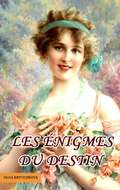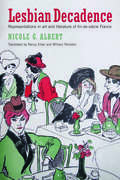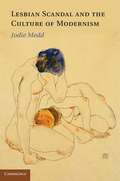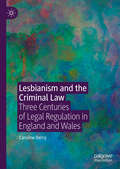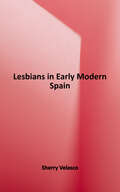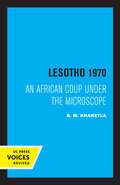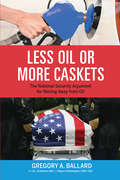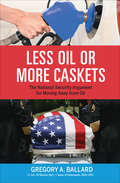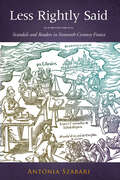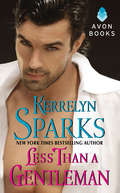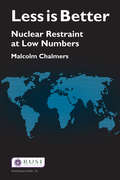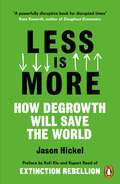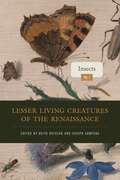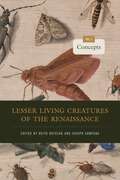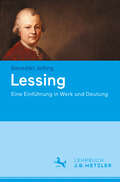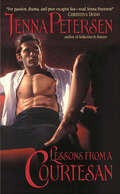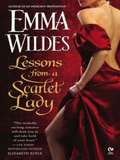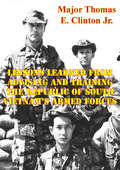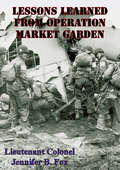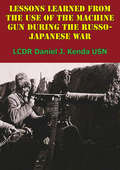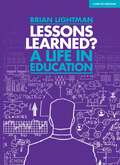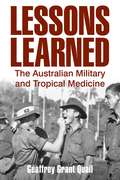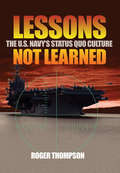- Table View
- List View
Les énigmes du destin
by Olga KryuchkovaLa description du livre La jeune fille Sonietchka Biroeva devine pour Noël. Dans le miroir se reflète le vague visage de son futur époux. Cependant, la fille voit que son promis est borgne, son visage est couvert par un bandage noir. Le temps passe et Sonia atteint seize ans et donc son premier bal chez la comtesse Preobrajenskaïa est à venir. Au bal Sonia rencontre un certain baron von Ounguer. À sa grande surprise, l'œil du baron est caché derrière un bandage noir, ce qui rend la fille vraiment inquiète. En outre, son cousin pour lequel elle nourrit des sentiments d’affection est en retard pour le bal sans avoir aucune excuse. Entretemps, Lisa fait connaissance au bal avec un officier de marine, monsieur Nijegorodskii. L’officier de marine avait perdu son œil lors d’une des expéditions. Après quelques jours monsieur Nijegorodskii apparaît dans la maison des Biroev. Il est sérieusement déterminé à propos de Lisa. Bientôt von Ounguer aussi le joint. Malheureusement, Sergueï Voronov ne peut pas consacrer du temps à Sonia et à la famille Biroev, car il se prépare pour la démonstration militaire. À sa place il envoie son ami, un lieutenant portant le nom italien Guardi, avec une lettre. Namedni Guardi se retrouva dans un combat et son œil droit était « décoré » par un bleu lourd qu’il avait donc recouvert par un bandage noir. En bref, dans le salon des Biroev se sont réunis trois hommes borgnes et deux charmantes demoiselles... Comment va finir cette rencontre ? Puisque Sonietchka est convaincue qu’elle va absolument épouser un homme borgne.
Lesbian Decadence: Representations in Art and Literature of Fin-de-Siècle France
by Nicole AlbertIn 1857 the French poet Charles Baudelaire, who was fascinated by lesbianism, created a scandal with Les Fleurs du Mal [The Flowers of Evil]. This collection was originally entitled "The Lesbians" and described women as "femmes damnées," with "disordered souls" suffering in a hypocritical world. Then twenty years later, lesbians in Paris dared to flaunt themselves in that extraordinarily creative period at the turn of the 19th and 20th centuries which became known as the Belle Époque. Lesbian Decadence, now available in English for the first time, provides a new analysis and synthesis of the depiction of lesbianism as a social phenomenon and a symptom of social malaise as well as a fantasy in that most vibrant place and period in history. In this newly translated work, praised by leading critics as "authoritative," "stunning," and "a marvel of elegance and erudition," Nicole G. Albert analyzes and synthesizes an engagingly rich sweep of historical representations of the lesbian mystique in art and literature. Albert contrasts these visions to moralists' abrupt condemnations of "the lesbian vice," as well as the newly emerging psychiatric establishment's medical fury and their obsession on cataloging and classifying symptoms of "inversion" or "perversion" in order to cure these "unbalanced creatures of love."Lesbian Decadence combines literary, artistic, and historical analysis of sources from the mainstream to the rare, from scholarly studies to popular culture. The English translation provides a core reference/text for those interested in the Decadent movement, in literary history, in French history and social history. It is well suited for courses in gender studies, women's studies, LGBT history, and lesbianism in literature, history, and art.
Lesbian Scandal and the Culture of Modernism
by Jodie MeddBefore lesbianism became a specific identity category in the West, its mere suggestion functioned as a powerful source of scandal in early twentieth-century British and Anglo-American culture. Reconsidering notions of the 'invisible' or 'apparitional' lesbian, Jodie Medd argues that lesbianism's representational instability, and the scandals it generated, rendered it an influential force within modern politics, law, art and the literature of modernist writers like James Joyce, Ezra Pound and Virginia Woolf. Medd's analysis draws on legal proceedings and parliamentary debates as well as crises within modern literary production - patronage relations, literary obscenity and cultural authority - to reveal how lesbian suggestion forced modern political, cultural and literary institutions to negotiate their own identities, ideals and limits. Medd's text will be of great interest to scholars and graduate students in gender and women's studies, modernist literary studies and English literature.
Lesbianism and the Criminal Law: Three Centuries of Legal Regulation in England and Wales
by Caroline DerryThis book offers a comprehensive examination of the ways in which the criminal justice system of England and Wales has regulated, and failed or refused to regulate, lesbianism. It identifies the overarching approach as one of silencing: lesbianism has not only been ignored or regarded as unimaginable, but was deliberately excluded from legal discourses. A series of case studies ranging from 1746 to 2013 from parliamentary debates to individual prosecutions shed light on the complex process of regulation through silencing. They illuminate its evolution over three centuries and explore when and why it has been breached. The answers Derry uncovers can be fully understood only in the context of surrounding social and legal developments which are also considered. Lesbianism and the Criminal Law makes an important contribution to the growing bodies of literature on feminism, sexuality and the law and the legal history of sexual offences.
Lesbians in Early Modern Spain
by Sherry VelascoIn this first in-depth study of female homosexuality in the Spanish Empire for the period from 1500 to 1800, Velasco presents a multitude of riveting examples that reveal widespread contemporary interest in women's intimate relations with other women. Her sources include literary and historical texts featuring female homoeroticism, tracts on convent life, medical treatises, civil and Inquisitional cases, and dramas. She has also uncovered many revealing illustrations from the period. The women in these accounts, stories, and cases range from internationally famous transgendered celebrities to lesbian criminals, from those suspected of "special friendships" in the convent to ordinary villagers. Velasco argues that the diverse and recurrent representations of lesbian desire provide compelling evidence of how different groups perceived intimacy between women as more than just specific sex acts. At times these narratives describe complex personal relationships and occasionally characterize these women as being of a certain "type," suggesting an early modern precursor to what would later be recognized as divergent lesbian, bisexual, and transgender identities.
Lesotho 1970: An African Coup under the Microscope (Perspectives on Southern Africa #5)
by B.M. KhaketlaThis title is part of UC Press's Voices Revived program, which commemorates University of California Press’s mission to seek out and cultivate the brightest minds and give them voice, reach, and impact. Drawing on a backlist dating to 1893, Voices Revived makes high-quality, peer-reviewed scholarship accessible once again using print-on-demand technology. This title was originally published in 1972.
Less Oil or More Caskets: The National Security Argument for Moving Away From Oil
by Gregory A. BallardEvery day, millions of Americans get behind the wheels of their car, peacefully unaware of where the gas that powers their vehicle originates. Only transportation and industrial uses consume significant quantities of oil in the United States, with transportation by far the dominant user. Electric power generated by oil is virtually nonexistent, while residential and commercial heating uses for oil continue to fall. In Less Oil or More Caskets: The National Security Argument for Moving Away From Oil, Greg Ballard profiles the history of US troops in the Middle East the last forty plus years and the impact the oil industry has had on our international politics. More than a recap, Ballard makes a call to action for American politicians and citizens to change their ideas about transportation in America. By changing the fuel in our vehicles and embracing new technologies in transportation, he argues that within two decades our nation and the world could be on the path to freedom from the current dependence on oil-rich nations. This would preclude the United States from having to send troops overseas to protect the supply of oil for the entire world, saving both dollars and lives. .
Less Oil or More Caskets: The National Security Argument for Moving Away from Oil
by Gregory A. BallardThe former Marine and Indianapolis mayor issues &“a call to action to shift from gasoline to electricity in transportation&” to transform our foreign policy (Hoosier History Live). Every day, millions of Americans get behind the wheels of their car, peacefully unaware of where the gas that powers their vehicle originates. Only transportation and industrial uses consume significant quantities of oil in the United States, with transportation by far the dominant user. Electric power generated by oil is virtually nonexistent, while residential and commercial heating uses for oil continue to fall. In Less Oil or More Caskets, Greg Ballard profiles the history of US troops in the Middle East the last forty plus years and the impact the oil industry has had on our international politics. More than a recap, Ballard makes a call to action for American politicians and citizens to change their ideas about transportation in America. By changing the fuel in our vehicles and embracing new technologies in transportation, he argues that within two decades our nation and the world could be on the path to freedom from the current dependence on oil-rich nations. This would preclude the United States from having to send troops overseas to protect the supply of oil for the entire world, saving both dollars and lives. &“Ballard is still proud of his initiatives to reduce the city&’s reliance on gasoline and has transformed that zeal into a national policy. His book emphasizes his hopes to bring the troops home by cutting funds that go to terrorism.&”—The Herald Bulletin &“An important, admonitory argument and appeal that will reward determined readers with open minds.&”—Kirkus Reviews
Less Rightly Said
by Antonia SzabariWell-known scholars and poets living in sixteenth-century France, including Erasmus, Ronsard, Calvin, and Rabelais, promoted elite satire that "corrected vices" but "spared the person"--yet this period, torn apart by religious differences, also saw the rise of a much cruder, personal satire that aimed at converting readers to its ideological, religious, and, increasingly, political ideas. By focusing on popular pamphlets along with more canonical works, Less Rightly Said shows that the satirists did not simply renounce the moral ideal of elite, humanist scholarship but rather transmitted and manipulated that scholarship according to their ideological needs. Szabari identifies the emergence of a political genre that provides us with a more thorough understanding of the culture of printing and reading, of the political function of invectives, and of the general role of dissensus in early modern French society.
Less Than a Gentleman
by Kerrelyn SparksIn this never-before-published historical romance, New York Times bestselling author Kerrelyn Sparks returns to the 18th century, where the fight for freedom is as dangerous as the fight for love. Between searching for the missing Munro sisters and South Carolina being all but lost to the British, Captain Matthais Thomas has more important things to worry about than finding a bride. But his mother has other ideas. When Matthais finds a beautiful woman in his bed who claims to be his betrothed, he is suspicious of her identity . . . and determined to discover the truth. Caroline Munro had few options. The British burned down her home, and now, traveling with her very pregnant sister, Caroline is pretending to be someone shes not so they can have a safe place to rest. But she didnt count on a matchmaking matron or her rogue of a son . . . and certainly never dreamed she would fall in love with a spy.
Less is Better: Nuclear Restraint at Low Numbers (Whitehall Papers)
by Malcolm ChalmersDespite the rise of ‘new’ security threats like terrorism, cyber-war and piracy, the terrible destructive power of nuclear weapons still hangs over the world. Discussion on further strategic nuclear arms reduction has tended to be dominated by the analysis of possible trade-offs between the US and Russia. But as the prospect of further cuts below ‘New START’ levels is contemplated, increasing attention needs to be paid to the possible shape of a new, multi-power approach to nuclear restraint. While restraint at low numbers goes with the grain of thinking in most nuclear states, correct sequencing will be vital. Using the New START framework, attention could initially be focused on incremental decreases in US and Russian stocks of the most dangerous weapons. Thereafter, the other nuclear powers would need to take steps to limit the size and capabilities of their own arsenals in a process of mutual reductions. If successful, the benefits would be wide ranging: successful restraint amongst existing nuclear-armed states could engender trust, as well as provide mechanisms for reducing the risks of rapid escalation in the event of limited conflict. Less is Better considers the various challenges and opportunities for ensuring restraint at low numbers in today’s complicated web of bilateral nuclear relationships and in the context of the debate on ‘Global Zero’.
Less is More: How Degrowth Will Save the World
by Jason Hickel'A powerfully disruptive book for disrupted times ... If you're looking for transformative ideas, this book is for you.' KATE RAWORTH, economist and author of Doughnut EconomicsA Financial Times Book of the Year______________________________________Our planet is in trouble. But how can we reverse the current crisis and create a sustainable future? The answer is: DEGROWTH.Less is More is the wake-up call we need. By shining a light on ecological breakdown and the system that's causing it, Hickel shows how we can bring our economy back into balance with the living world and build a thriving society for all. This is our chance to change course, but we must act now.______________________________________'A masterpiece... Less is More covers centuries and continents, spans academic disciplines, and connects contemporary and ancient events in a way which cannot be put down until it's finished.' DANNY DORLING, Professor of Geography, University of Oxford'Jason is able to personalise the global and swarm the mind in the way that insects used to in abundance but soon shan't unless we are able to heed his beautifully rendered warning.' RUSSELL BRAND'Jason Hickel shows that recovering the commons and decolonizing nature, cultures, and humanity are necessary conditions for hope of a common future in our common home.' VANDANA SHIVA, author of Making Peace With the Earth'This is a book we have all been waiting for. Jason Hickel dispels ecomodernist fantasies of "green growth". Only degrowth can avoid climate breakdown. The facts are indisputable and they are in this book.' GIORGIS KALLIS, author of Degrowth'Capitalism has robbed us of our ability to even imagine something different; Less is More gives us the ability to not only dream of another world, but also the tools by which we can make that vision real.' ASAD REHMAN, director of War on Want'One of the most important books I have read ... does something extremely rare: it outlines a clear path to a sustainable future for all.' RAOUL MARTINEZ, author of Creating Freedom'Jason Hickel takes us on a profound journey through the last 500 years of capitalism and into the current crisis of ecological collapse. Less is More is required reading for anyone interested in what it means to live in the Anthropocene, and what we can do about it.' ALNOOR LADHA, co-founder of The Rules'Excellent analysis...This book explores not only the systemic flaws but the deeply cultural beliefs that need to be uprooted and replaced.' ADELE WALTON
Lesser Hippias
by PlatoPlato studied under Socrates and was Aristotle's teacher. Together these three Greeks developed the basis of philosophical thinking for the entire Western world. Plato was also a writer, mathematician, and founder of the Academy in Athens, which was the first university in Europe. Lesser Hippias is also known as Hippias Minor. This is thought to be one of Plato's earlier works in which Socrates matches wits with the literary critic Hippias. From Wikipedia " Hippias believes that Homer can be taken at face value, and that Achilles may be believed when he says he hates liars. Socrates argues that Achilles is a cunning liar who throws people off the scent of his own deceptions, and that cunning liars are actually the "best" liars. Socrates proposes, possibly for the sheer dialectical fun of it, that it is better to do evil voluntarily than involuntarily. His case rests largely on the analogy with athletic skills, such as running and wrestling. He says that runner or wrestler who deliberately sandbags is better than the one who plods along because he can do no better. "
Lesser Living Creatures of the Renaissance: Volume 1, Insects (Animalibus)
by Keith Botelho and Joseph CampanaLesser Living Creatures examines literary and cultural texts from early modern England in order to understand how people in that era thought about—and with—insect and arachnid life. Designed for the classroom, the book comprises two volumes—Insects and Concepts—that can be used together or independently. Each addresses the collaborative, multigenerational research that produced early modern natural history and provides new insights into the old question of what it means to be human in a world populated by beasts large and small.Volume 1, Insects, examines how insects burrowed into the literal and symbolic economies of the era. The contributors consider diminutive creatures—such as bees and beetles, flies and fleas, silkworms and spiders—and their depictions in plays, poetry, fables, natural histories, and more. In doing so, they illuminate how early modern science and literature worked as intersecting systems of knowledge production about the natural world and show definitively how insect life was, and remains, intimately entangled with human life.In addition to the editors, contributors to this volume include Chris Barrett, Roya Biggie, Bruce Boehrer, Gary Bouchard, Dan Brayton, Eric Brown, Mary Baine Campbell, Perry Guevara, Shannon Kelley, Emily King, Karen Raber, Kathryn Vomero Santos, Donovan Sherman, and Steven Swarbrick.
Lesser Living Creatures of the Renaissance: Volume 2, Concepts (Animalibus)
by Keith Botelho and Joseph CampanaLesser Living Creatures examines literary and cultural texts from early modern England in order to understand how people in that era thought about—and with—insect and arachnid life. The conversations in this two-volume set address the collaborative, multigenerational research that produced early modern natural history and provide new insights into the old question of what it means to be human in a world populated by beasts large and small.Volume 2, Concepts, explores ideas that cut across species, insect and otherwise, both building on and invigorating critical vocabularies developed over nearly two decades of early modern animal studies. The contributors explore topics such as the medical and culinary consumption of insects; extermination campaigns; the auditory and emotive effects of a swarm; insects and politics; and notions of infestation, stinging, and creeping. Throughout, they illuminate how early modern science and literature worked as intersecting systems of knowledge production about the natural world and show definitively how insect life was, and remains, intimately entangled with human life.In addition to the editors, contributors to this volume include Lucinda Cole, Frances E. Dolan, Lowell Duckert, Andrew Fleck, Rebecca Laroche, Jennifer Munroe, Amy L. Tigner, Jessica Lynn Wolfe, Derek Woods, and Julian Yates.
Lessing: Eine Einführung in Werk und Deutung
by Benedikt JeßingGotthold Ephraim Lessing ist neben Schiller und Goethe der meistgelesene und -unterrichtete deutsche Dichter des 18. Jahrhunderts. Sein Werk, das v.a. mit dem Begriff des bürgerlichen Trauerspiels und dem Nathan verbunden ist, umfasst daneben Lustspiele, Fabeln und Lyrik und gilt als Höhepunkt der literarischen Aufklärung. Mindestens ebenso wichtig zum Verständnis seiner Schriften ist die Tradition der Empfindsamkeit, die er in seinen theoretischen Arbeiten und literarischen Werken fortführt. Der Band erschließt auf Basis einer knappen Erörterung der theoretischen Positionen die wichtigsten Werke Lessings in textnahen Lektüren.
Lessons From a Courtesan
by Jenna PetersenLesson #1: Every man loves a mystery.A scandalous siren called "Ria" has electrified the ton. Every gentleman in London desires her; every woman envies her. And they are all desperate to know the secrets of the tantalizing, seductively beautiful courtesan. All except Justin, the Earl of Baybary. He knows all about Ria. He learned every inch of her tender skin, every taste of her luscious lips . . . on their wedding night. Lesson #2: No man can make you lose control . . . unless you let him.Though theirs was an arranged marrige, still Victoria surrendered to passion and gave herself to Justin completely. When he left her alone the next morning, she swore she would never again let him into her bed. Now, though she has other reasons for returning to the city, she enjoys tormenting Justin, letting him see the way other men lust for her. But keeping herself from him is such exquisite torture . . . and forgiveness will lead to an ecstasy unbelievably divine.
Lessons From a Scarlet Lady
by Emma WildesNo real lady should take lessons from a scarlet woman... The Duke of Rolthven's new wife, Brianna, is the perfect aristocratic bride. So what would society say if they saw her with a copy of Lady Rothburg's Advice--a courtesan's lessons for the boudoir? When his innocent wife suddenly becomes a vixen in the bedroom, the proper Duke is truly astounded by her seductive powers. Following a courtesan's advice might lead to trouble-but will it lead to Brianna's ultimate desire: winning her husband's love?
Lessons Learned From Advising And Training The Republic Of South Vietnam’s Armed Forces
by Major Thomas E. Clinton Jr. USMCThe United States (US) has a long history of employing military advisors, from the American military occupation of the Philippines throughout the 19th century, and the Korea War in the 1950s, the Vietnam War 1950 to 1973, El Salvador 1984 to 1992, to current efforts in Operation Enduring Freedom and Operation Iraqi Freedom (OIF). A strong Iraqi military is needed to support the future democratic government of Iraq. This will allow the US to disengage a large portion of its combat units from Iraq. The US must train the present Iraqi military to successfully take over responsibility for Iraq's security and combat the current insurgency. The US Army and Marine Corps combat advisors will play a key role in ensuring the Iraqi military is properly organized, trained, and equipped to provide for a secure Iraq. There are lessons learned from training and advising the Republic of South Vietnam's Armed Forces (RVNAF) during the Vietnam War 1950 to 1973 that could be applied in the ongoing advisory effort in Iraq. The focus of this thesis is to determine the lessons learned from selecting, training, and the organization of US Army and Marine Corps advisors during the Vietnam War.
Lessons Learned From Operation Market Garden
by Lieutenant Colonel Jennifer B. FoxOperation Market Garden was the largest paratroop drop of the Second World War; It was also one of the worst operational failures. What strategy could have led the Allies to such an incredulous failure and what lessons can be learned for future military operations? Several timeless lessons are apparent from an analysis of the operation: (1) at the strategic level, military planners must never lose sight of the political reasons which fostered the initial conflict; (2) at the operational level, total coordination and planning with all elements of an operation remain critical to the successful execution of any plan; (3) logistics shortages caused the troops to be ill prepared; (4) most importantly, at the tactical level commanders must learn to "read the troops," watch their collective behavior and be ready to step in to keep them focused on the ultimate goal, the satisfactory completion of the mission; (5) from a leadership perspective, we learn that truly great leaders sacrifice their personal ambitions for the good of the unit effort and the successful execution of the mission.
Lessons Learned From The Use Of The Machine Gun During The Russo-Japanese War
by LCDR Daniel J. KendaDr. Richard Gatling invented the world's first practical machine gun in 1862. Between that weapon and subsequent improved designs, the world's armies had roughly 50 years to adopt the machine gun and perfect its employment before it helped wreak the carnage of World War I. However, for some reason or combination of reasons, none of the armies of the day saw fit to do so. This thesis explores the potential explanations behind this phenomenon by using the Russo-Japanese War as a case study. The Russo-Japanese War should have demonstrated to the world how the machine gun fundamentally altered the conduct of land warfare, especially since the major world powers all sent military observers to report on the war's events. This thesis will show, however, that because of a complex combination of the prevalent military tactical culture, bureaucratic pragmatism and logistical concerns, the five major protagonist armies of World War I generally failed to apply the lessons they learned about machine-gun employment from the Russo-Japanese War and as a result were completely surprised by the weapon's impact on the battlefield ten years later.
Lessons Learned: A Life In Education
by Brian LightmanDrawing on 38 years of experience, Brian Lightman's perceptive and thoughtful book is a reflective account of his career, looking at the development of the education system both from his perspective as a teacher and school leader and, more recently, as one involved in national policy. Major themes include the disruptive impact of the electoral cycle that has consistently led to a failure for developments to be properly embedded, and a visceral criticism of what the author sees as a highly polarised and divided education service in the Michael Gove era. The final section makes the case for a radical change to the culture that pervades our education service.
Lessons Learned: A Life In Education
by Brian LightmanDrawing on 38 years of experience, Brian Lightman's perceptive and thoughtful book is a reflective account of his career, looking at the development of the education system both from his perspective as a teacher and school leader and, more recently, as one involved in national policy. Major themes include the disruptive impact of the electoral cycle that has consistently led to a failure for developments to be properly embedded, and a visceral criticism of what the author sees as a highly polarised and divided education service in the Michael Gove era. The final section makes the case for a radical change to the culture that pervades our education service.
Lessons Learned: The Australian Military and Tropical Medicine
by Geoffrey Grant QuailHistorically, prolonged campaigns have been frequently lost or won because of the greater fitness of one of the combatant armies. In the twentieth century, infection was still a major problem, leading to withdrawal from Gallipoli, and the near defeat of the Allies due to malaria early in the Second World War&’s Pacific campaign. Malaria emerged again as a major problem in the Vietnam War. The Australian Army Medical Corps, founded in 1901, learned from past medical experience. However, errors leading to significant morbidity did occur mainly in relation to malaria. These errors included lack of instruction of doctors sent to New Guinea with the Australian Force in the Great War, inadequate prophylactic measures against malaria in New Guinea early in World War Two, failure to perceive the threat of emerging resistant strains of malaria in the 1960s, and military commanders not fully implementing the recommendations of their medical advisers. Many Australian campaigns have taken place in tropical locations; a substantial amount of scientific work to prevent and manage tropical diseases has therefore been conducted by the Army Medical Corps&’ medical researchers—particularly in the Land Headquarters Medical Research Unit and the Army Malaria Institute. Their work extends well beyond the military, greatly improving health outcomes throughout the world. This book recognises the efforts of both.
Lessons Not Learned
by Roger ThompsonDespite its reputation as the most impressive naval force in the world, the U.S. Navy is in trouble, according to the author of this book, and systemic weaknesses could be its undoing. Here, military sociologist Roger Thompson provides a compelling, often scathing, assessment of the U.S. Navy and its learning disabilities and then presents a convincing argument for reform.Thompson points to the U.S. Navy's "up or out" promotion system, massive personnel turnover, inexperienced crews, and drug and alcohol abuse as problems that make it difficult for the Navy to build cohesive, well-trained fighting units. In a review of the Navy's recent history, he finds that its ships, submarines, and aircraft are often outperformed in competitions and exercises with other navies-and its failures are either denied altogether or perfunctorily excused. Diesel submarines-so quiet that they are rarely detected until it's too late to prevent an attack-routinely surpass expensive U.S. nuclear subs and put U.S. aircraft carriers in danger. American naval pilots, whose weapons are often improperly tested, are frequently bested by military pilots from other countries. Because the U.S. Navy doesn't have enough surface ships to protect its capital ships, American carrier strike groups now use Canadian ships as escorts. Shortcomings like these, Thompson argues, undermine the Navy's potential and should be cause for national concern.In presenting a side of the U.S. Navy that's rarely discussed, this book spells out lessons the Navy must learn if it is going to succeed in an era of asymmetrical warfare-of David-versus-Goliath conflicts. In his conclusion, the author puts forth a twelve-step program that calls on the U.S. Navy to rethink its naval strategy, to lose some weight, and to focus on the fundamentals.
